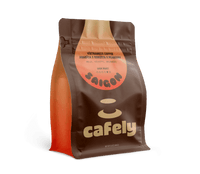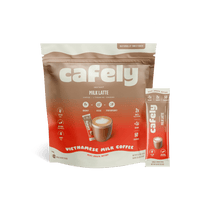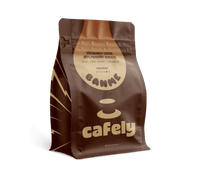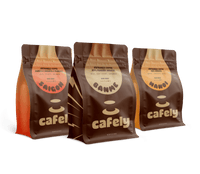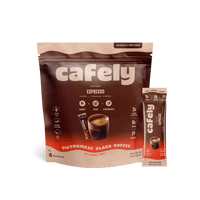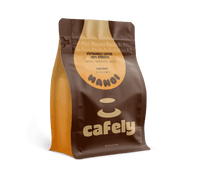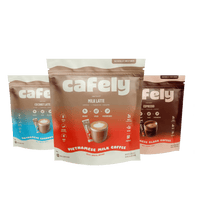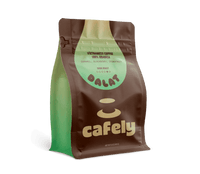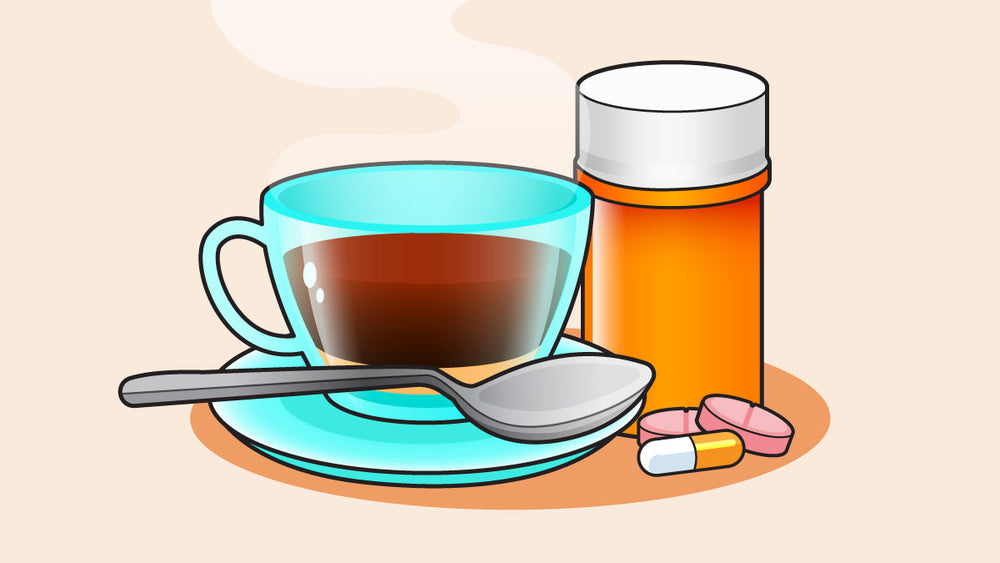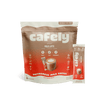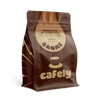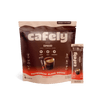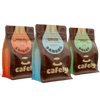When you're feeling under the weather, every choice about what you consume can impact your recovery.
Coffee — a drink with numerous health benefits for healthy individuals — may actually make symptoms of cold and flu worse. Coffee impairs our ability to sleep and increases both metabolism and body temperature.
In general, you should avoid coffee when you’re under the weather, but there are a few benefits it can offer if used in moderation. Let’s start here before moving into 3 reasons to avoid coffee if you’re currently sick.
Benefits of Drinking Coffee When Sick

Coffee contains a ton of health-promoting ingredients, including antioxidants, stimulating compounds, mood-enhancers, and more. If used in moderation, these compounds could help us get through an illness more smoothly. Overdo it though and you could set back recovery by a couple of days.
1. Rich Antioxidant Source
Coffee is a richsource of antioxidants. These compounds have been shown to reduce free-radical damage and inflammation throughout the body [1].
Pathogens like viruses and bacteria hiijack the cells to turn them into free radical factories — causing widespread inflammation and damage. This makes it especially important to increase your intake of antioxidants both during the illness as well as the recovery afterward.
Antioxidants also help protect cell membranes, enzymes, DNA, and tissues to fight illness better [2].
Related: Is Vietnamese Coffee Good for You?
2. Reduces Fatigue
Caffeine reduces fatigue and increases alertness, which can help if you're feeling under the weather.
The grogginess felt from a winter cold can be helped with a hot cup of coffee. In a study examining caffeine's effect on sleep-deprived individuals, results showed improvements in three areas [3]:
- Mood
- Performance
- Alertness
These positive effects are especially useful when you're on the upswing. You're still feeling the heavy lag from being sick but are ready to get back to work.
If you're currently sick, the best medicine is rest, and drinking too much coffee can mask the signals your body is sending to help you get that much-needed rest. Don't ignore it!
3. Improved Mood
It’s normal to feel down when you’re sick, but coffee can help improve mood and headaches [4], which can help ease depressive feelings often felt when you’re not running on all cylinders. This improves your sense of well-being so you can beat your sickness and get back to full strength.
Have had too much to drink?
A hangover isn’t really caused by an illness but can make you feel sick, lethargic, and sluggish. If you’ve had too much alcohol the past night, it helps to look into the best coffee when having hangovers. These beans are gentler on the stomach but still effective at boosting alertness and replenishing energy.
Risks of Drinking Coffee When Sick
Still, there are some risks to consider, but overall, it depends on personal circumstances, such as the type of illness you're battling along with your body's reaction to coffee.
Here are some reasons you should consider not drinking coffee when sick.
1. Dehydration
When consumed in large quantities without adequate hydration, coffee may lead to dehydration. This isn't ideal ever, but it’s even more critical to avoid when your body needs fluids. It isn't all bad news though! Recent studies suggest dehydration from coffee is more complex — and less likely — than previously thought.
A caffeine intake of 4 mg/ kg of body weight doesn't result in dehydration [5]. Drinking more than a moderate amount of regular coffee may impact hydration negatively. It's best to stick to moderate doses and cut the risk of dehydration, or just drink more water.
2. Sleep Interference

If you've ever sipped on a brew a couple of hours before going to bed, you'll know how caffeine can affect sleep. Caffeine can negatively impact the quality and length of sleep, so It's advisable to restrict caffeine intake 6-9 hrs before bedtime [6].
But is it bad to drink coffee when sick? Consuming coffee in moderation or small amounts when ill can be beneficial. It's essential, however, to drink plenty of fluids alongside coffee and avoid caffeine a few hours before hitting the pillow. Doing so improves the chances of better sleep after consuming coffee, which is crucial for recovery and overall well-being.
Related: How to Stay Awake Without Caffeine
3. May Worsen Certain Conditions
The effects of coffee on the gastrointestinal system lean towards coffee's negative impacts. This has remained the same for many years, with studies highlighting concerns with coffee and poor gastro symptoms [7]. But coffee's role needs further investigation.
Recent research suggests coffee doesn't impact reflux and ulcers. With moderate consumption, coffee aids digestion, stimulates gastric acid, and modulates intestinal flora [8].
Different people have various caffeine experiences. If you suffer from acid reflux, ulcers, or other digestive problems, it's best to limit caffeine. Track your symptoms and speak with a doctor, and consider switching to the best coffee for ulcers so you and your stomach can enjoy coffee safely!
How to Consume Coffee Responsibly When Sick
Continuing your coffee habits while fighting illness is possible, but it's essential to get things right. Coffee lovers wonder is coffee bad when you have a cold or is coffee good when sick, and the answer is that it can be when consumed in the right way.
1. Limit Intake to Early in the Day
Coffee has a profound impact on sleep. Drinking your last cup several hours before bedtime is vital to avoid a restless night. Delve into a mug of your favorite coffee in the morning and at lunchtime, but allow plenty of time without caffeine before you go to sleep. If you crave a brew mid-afternoon, reach for decaf or a refreshing herbal tea.
Related: How Long Does Caffeine Stay In Your System?
2. Drink Plenty of Water
Hydration is essential for maintaining normal cognition, mood, and other factors [9]. Although coffee and dehydration is a complex issue, drinking enough water is critical. This helps tackle dehydration and keeps the body working well while fighting sickness.
For every cup of coffee you drink, you should follow it up with 2 cups of water.
3. Switch to Decaf While You’re Sick
Caffeine metabolizes at varying rates between people. Some are more or less sensitive to caffeine, which is why monitoring caffeine sensitivity is helpful.
When you're feeling under the weather, the last thing you want to deal with is caffeine's side effects. If you experience increased anxiety, heart palpitations, jitteriness, or poor sleep after coffee, explore alternatives.
Weaker brews and decaffeinated options provide the familiar comfort of coffee but with less caffeine.
Related: How is Decaf Coffee Made? 4 Methods Explained
Coffee Alternatives to Enjoy While You’re Sick

Reaching for coffee is a surefire energy booster, but alternatives are useful when sick. Above all, water is critical for hydration. Sipping on water throughout the day will support your body's recovery and natural functions, which is exactly what your body needs. But there are other tasty ways to hydrate.
1. Herbal Tea
Herbal teas like chamomile or ginger provide flavorful, caffeine-free hydration. Ginger has proven anti-inflammatory effects, which may be useful in fighting certain conditions [10]. Enjoying a warm ginger and lemon tea in the morning can be a beneficial alternative to coffee.
If you don’t like ginger, try a different herbal tea. They’re packed with benefits.
2. Bone Broth
Broths, both vegetable and meat-based, can provide warmth, comfort, and nutrients. The combination of vegetables, protein, and soothing liquid is gentle on the body. Broth is also easy to prepare, and making a big batch means you can fill your body with goodness for days.
3. Electrolyte Drinks
Additionally, electrolyte-replenishing drinks are another great way to go. They can be more effective than water in preventing dehydration and delaying fatigue [11]. Be on the lookout for the sugar content of sports drinks, as some contain far more than others, making them a less healthy choice.
When To Avoid Coffee Altogether
Avoiding coffee is advisable when experiencing severe nausea, vomiting, or diarrhea. It's also best to reduce or stop regular coffee consumption if you have acid reflux or stomach ulcers.
Caffeine can worsen gastroesophageal reflux in some consumers [12]. So, opting for decaf coffee or caffeine-free alternatives can help reduce symptoms.
It’s also important to note that coffee can interact with certain medications, such as the following [13]:
- Anticoagulant/Antiplatelet
- Tricyclic antidepressants
- Lithium
- Stimulant drugs
- Theophylline
- Verapamil
- Levothyroxine
- Birth control pills
- Cimetidine
- Fluconazole
- Antidiabetic drugs
This list isn’t conclusive, so ask your doctor if coffee interacts with any of the medications you're taking. Coffee is one of the most known drinks to affect the pharmacokinetic interactions with drugs [14].
This may not be the case for the meds you're taking, but be safe and ask your doctor.
Related: What You Need to Know About Caffeine Withdrawal
FAQs: Should You Drink Coffee When Sick?
Read on to find out our answers to some commonly asked questions.
1. Can coffee help alleviate common cold symptoms?
Coffee might help reduce the feeling of fatigue and increase alertness, but it does not directly alleviate cold symptoms. It can be consumed in moderation alongside water to provide ideal hydration.
2. Is it safe to drink coffee with a fever?
Coffee is generally safe in moderation, but make sure you get sufficient hydration with water. If you experience symptoms like reduced sleep or increased jitteriness, lower your caffeine intake to avoid worsening symptoms.
3. How does coffee affect recovery from illness?
For recovery from illness, coffee can be beneficial and detrimental. This depends on the illness and how coffee is consumed. In large doses, coffee can worsen anxiety and sleep quality — not ideal when you’re trying to beat an illness! Moderate coffee consumption can improve alertness and cognitive function to help you feel more like yourself.
4. Can I drink coffee if I have the flu?
Limit coffee if you have the flu as it may dehydrate you, making things harder when battling flu-related symptoms. Opt for water instead, and limit your overall caffeine intake to get ample rest.
5. Are there benefits to drinking decaf when sick?
Decaf can provide the comfort of coffee without the potentially negative effects of caffeine. Wanting your normal cup of coffee in the morning is normal, but water or decaf coffee can provide hydration and let your mind and body rest.
6. What are the best times to drink coffee when sick?
Drinking coffee is best done in the morning or early afternoon to avoid interference with sleep. Reach for decaf or herbal tea in the hours running up to bedtime and your morning coffee shouldn’t have much of an effect on your sleep.
7. Should I avoid coffee if I have a stomach virus?
Coffee may irritate your stomach lining and exacerbate symptoms when consumed in large doses. So, it’s wise to skip your morning brew if you have a stomach virus.
8. What can I add to my coffee to make it more soothing when sick?
Consider adding honey or lemon to soften coffee’s impact and provide additional comfort when sick. Making your coffee weaker can lessen the intensity while allowing you to enjoy the deep, familiar flavors.
9. Does coffee interact with cold medicines?
Caffeine can interact with certain medications, enhancing their effects or side effects. It’s crucial to read the information leaflet for your medication or consult a doctor to find out if it’s safe for you to drink coffee.
10. Are there any specific illnesses that should completely avoid coffee?
Conditions like gastritis, acid reflux, and ulcers may require you to avoid coffee to prevent symptom flare-ups. It’s worth seeing if decaf coffee is an option so you can still get the coffee taste without worsening existing conditions.
References
- Liang, N., & Kitts, D. D. (2014). Antioxidant property of coffee components: assessment of methods that define mechanisms of action. Molecules (Basel, Switzerland), 19(11), 19180–19208.
- Bendich A. (1993). Physiological role of antioxidants in the immune system. Journal of Dairy Science, 76(9), 2789–2794.
- Marriott, B. M. (1994). Effects of Caffeine on Cognitive Performance, Mood, and Alertness in Sleep-Deprived Humans. Food Components to Enhance Performance - NCBI Bookshelf.
- Haskell-Ramsay, C. F., Jackson, P. A., Forster, J. S., Dodd, F. L., Bowerbank, S. L., & Kennedy, D. O. (2018). The Acute Effects of Caffeinated Black Coffee on Cognition and Mood in Healthy Young and Older Adults. Nutrients, 10(10), 1386.
- Killer, S. C., Blannin, A. K., & Jeukendrup, A. E. (2014). No evidence of dehydration with moderate daily coffee intake: a counterbalanced cross-over study in a free-living population. PloS one, 9(1), e84154.
- Gardiner, C., Weakley, J., Burke, L. M., Roach, G. D., Sargent, C., Maniar, N., Townshend, A., & Halson, S. L. (2023). The effect of caffeine on subsequent sleep: A systematic review and meta-analysis. Sleep medicine reviews, 69, 101764.
- Zhang, Y., & Chen, S. H. (2013). Effect of Coffee on Gastroesophageal Reflux Disease. Food Science and Technology Research, 19(1), 1–6.
- Taborska, N., Martyka, A., Figiel, M. K., & Ujma, P. (2024). The impact of consumed coffee on the digestive system - review of the latest research. Journal of Education, Health, and Sport, 53, 32–43.
- Liska, D., Mah, E., Brisbois, T., Barrios, P. L., Baker, L. B., & Spriet, L. L. (2019). Narrative Review of Hydration and Selected Health Outcomes in the General Population. Nutrients, 11(1), 70.
- Anh, N. H., Kim, S. J., Long, N. P., Min, J. E., Yoon, Y. C., Lee, E. G., Kim, M., Kim, T. J., Yang, Y. Y., Son, E. Y., Yoon, S. J., Diem, N. C., Kim, H. M., & Kwon, S. W. (2020). Ginger on Human Health: A Comprehensive Systematic Review of 109 Randomized Controlled Trials. Nutrients, 12(1), 157.
- Ruiz, Y., García, M. (2022). Isotonic sports drinks: formulation and physiological effects of their consumption. QhaliKay Revista de Ciencias de la Salud ISSN 2588-0608. 6. 73-84.
- Mehta, R. S., Song, M., Staller, K., & Chan, A. T. (2020). Association Between Beverage Intake and Incidence of Gastroesophageal Reflux Symptoms. Clinical Gastroenterology and Hepatology, 18(10), 2226-2233.e4.
- Arakelyan, H. S. (2021). Coffee and Medication Dangerous Interaction.
- Belayneh, A., & Molla, F. (2020). The Effect of Coffee on Pharmacokinetic Properties of Drugs: A Review. BioMed research international, 2020, 7909703.
